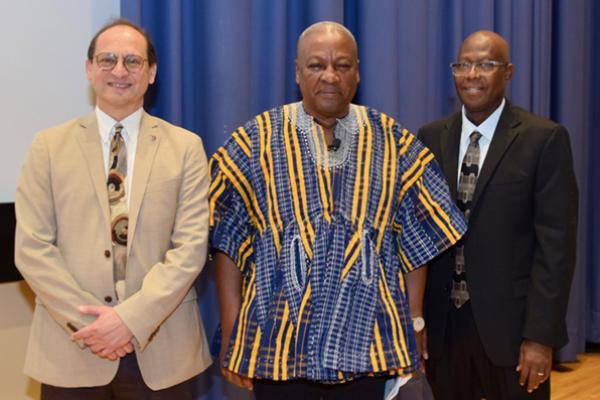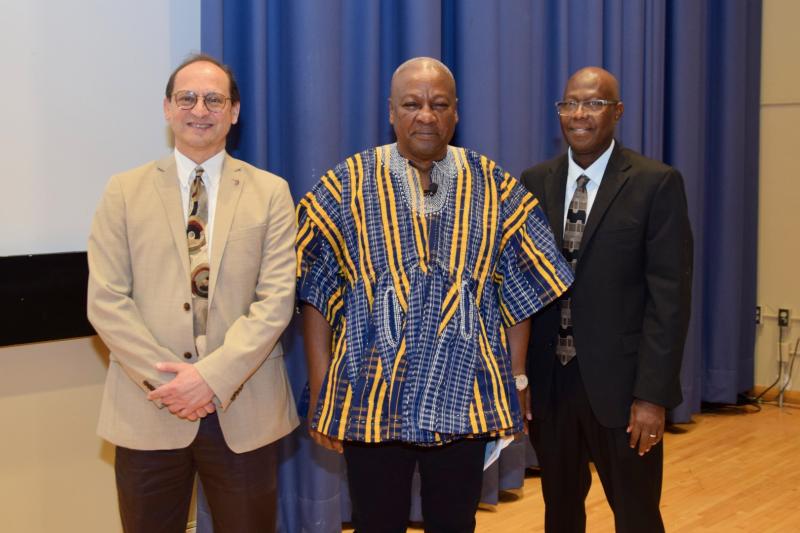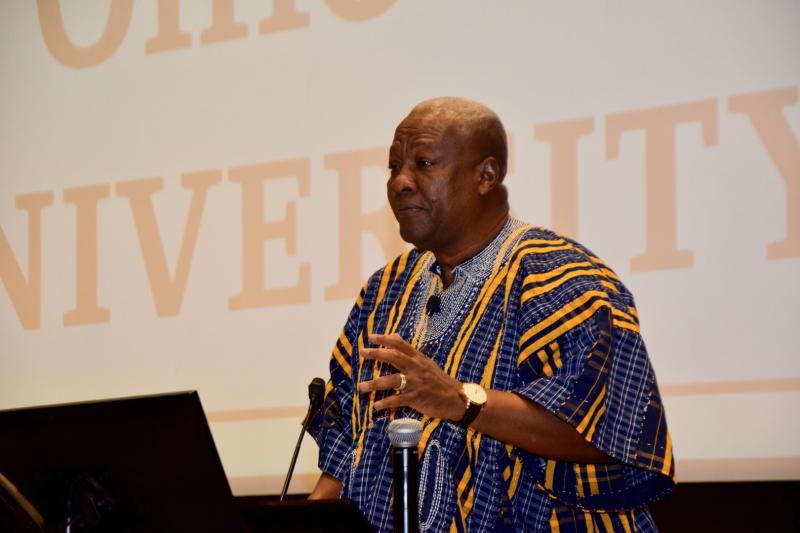Former Ghanaian President John Mahama visits Ohio State ahead of re-election bid

From the Office of International Affairs:

John Mahama was the president of Ghana from 2012 to 2017, following a decades-long career serving as a member of Parliament and then vice president for the West African nation. The Ohio State University’s Center for African Studies hosted a visit and lecture from Mahama on October 27. Mahama shared sweeping insights about pan-African history, the rise and challenges of African democracy and his vision for a thriving Africa in the years to come.
Mahama, a former history teacher, began by outlining how the African nations liberated themselves from colonial rule throughout the middle decades of the 20th century. “My country was the first south of the Sahara to gain independence from colonialism,” he explained, regarding the process by which Ghana became a republic in 1957. “It was a time of great excitement and hope,” Mahama said. Unfortunately, unrest soon followed. Mahama was a child at boarding school when the first coup d'état occurred in 1966, leading to a period of successive coups and authoritarian rule marked by ongoing ethnic divisions and violence.
Mahama was personally impacted by the first of these coups. His father, Emmanuel Adama Mahama, was a member of Parliament for the West Gonja constituency under Ghana's first president, Kwame Nkrumah. During the coup in 1966, he was thrown in jail, leaving nobody to pick up Mahama from boarding school. “The home I knew as my father’s was occupied by military officers,” he recalled.
Ultimately, Mahama’s father was released and Mahama continued his education at Ghana Secondary School and later, the University of Ghana. He went on to study at the Institute of Social Sciences in Moscow and obtained a postgraduate degree in 1988. Mahama began his political career in 1996 as a member of Parliament.
During the 1990s and 2000s, Ghana gained a measure of political stability. Mahama spoke on how many factors including improved technology, an influx of tourism, democratic elections with strong citizen participation and rapid economic growth throughout the continent helped usher in a new era for Ghana.

Despite considerable progress, the West African nation continues to face considerable challenges. In 2022, Ghana experienced an economic downturn that pushed an estimated 850,000 families into poverty according to the World Bank. “Democracy is indeed under threat in Africa,” he said. Mahama highlighted issues such as institutional corruption, a growing youth population with high unemployment and the disruptive impacts of climate change. “We cannot let ourselves forget we are relatively new countries,” said Mahama. “Every nation goes through growing pains. We are still figuring out how best to belong to ourselves.”
“But context is important when you talk about Africa,” Mahama clarified. Mahama described how he believes “we are moving into populism and authoritarianism and the era of the strong man rule” throughout the world, Africa included. “Africa is often made to seem like an outlier, removed from the larger global body of affairs.” But Mahama insists, nothing could be farther from the truth.
After his lecture, Mahama fielded questions from the audience on topics ranging from maternal health outcomes to Ghanaian trade policy to education. “We must invest in the education and empowerment of our young people,” he said. “They are the torch bearers of democracy.”
Mahama himself hopes to continue being a torch bearer of democracy, aiming to regain the presidency at the next Ghanaian election on December 7, 2024.
This lecture, part of a public lecture series on contemporary African affairs, was co-sponsored by the Mershon Center for International Security Studies, Department of History, Department of African American and African Studies, Office of International Affairs, Global One Health Initiative, Columbus Council on World Affairs and the Columbus Museum of Art.
